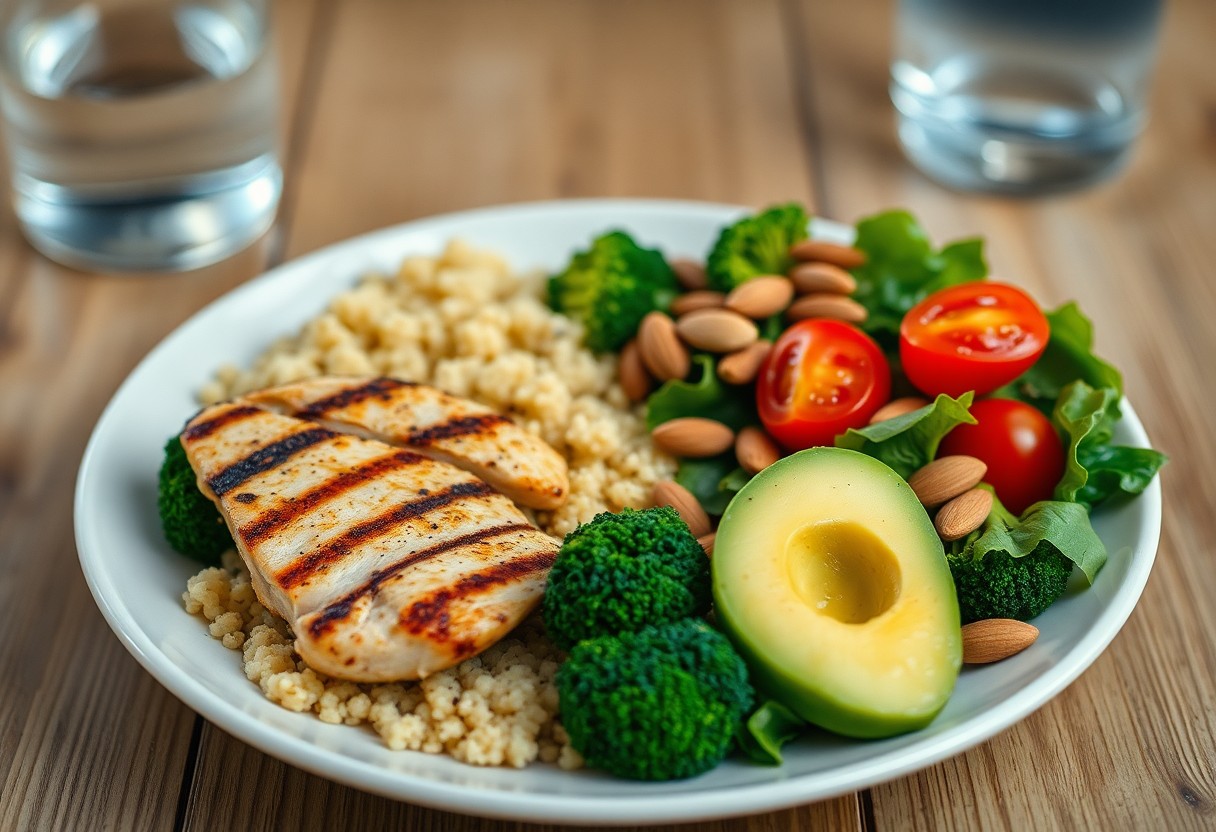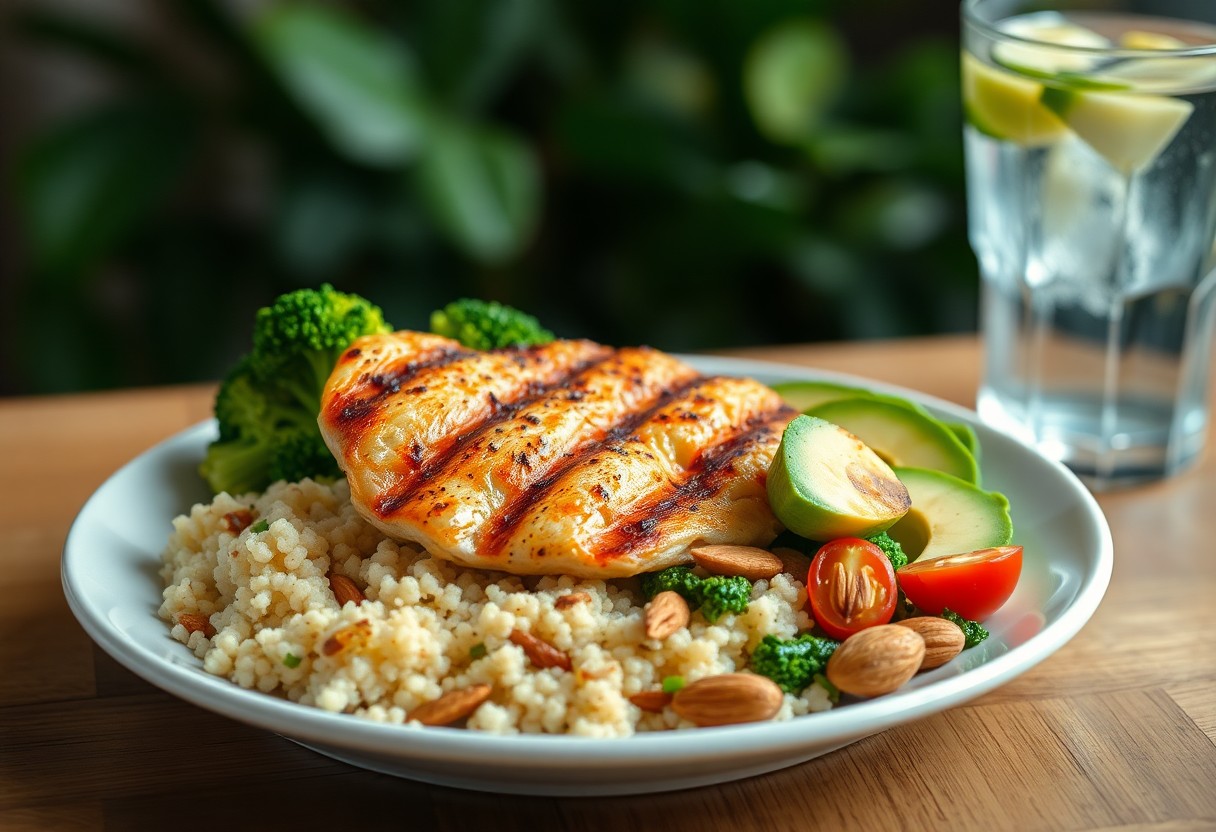There's a wealth of information available on maintaining a balanced diet, but following a structured plan can simplify your journey towards better nutrition. A 2000 calorie meal plan serves as an excellent framework for ensuring you meet your daily energy needs while incorporating important nutrients. In this guide, you'll discover how to create satisfying meals and snacks that promote overall health, keeping you energized and feeling your best throughout the day. Let's research into what a balanced 2000 calorie meal plan looks like and how you can tailor it to fit your lifestyle.

Understanding 2000 Calories
While navigating your nutrition, it’s vital to grasp the significance of a 2000-calorie diet. This caloric intake is often used as a baseline guideline for daily energy needs, helping you create meal plans that promote a balanced diet. By understanding how to meet this caloric goal, you can ensure that you fuel your body effectively while prioritizing health and wellness.
Daily Caloric Needs
An individual's daily caloric needs can vary based on age, gender, weight, height, and activity level. By evaluating these factors, you can better understand whether 2000 calories is appropriate for your personal health goals, such as weight maintenance, loss, or gain. Adjusting your intake based on your lifestyle will help you achieve optimal results.
Caloric Distribution for Macronutrients
On a 2000-calorie diet, how you distribute your calories among macronutrients—carbohydrates, proteins, and fats—greatly influences your overall health. Each macronutrient plays a unique role in your diet; for instance, carbohydrates provide energy, while protein supports muscle repair, and fats are vital for hormone production.
Daily, you should aim for a balanced distribution of macronutrients. Generally, it's recommended that 45-65% of your calories come from carbohydrates, 10-35% from protein, and 20-35% from fats. This balance will help ensure that you're not only meeting your energy needs but also supporting your body's various functions, contributing to overall health and well-being.
Building a Balanced Meal Plan
Some key components create a balanced meal plan. To ensure you meet your nutritional needs while enjoying your food, you should focus on a variety of food groups, including carbohydrates, proteins, and healthy fats. Incorporating fruits, vegetables, whole grains, lean meats, and dairy products will help you enjoy diverse flavors and textures, making the eating experience more satisfying.
Selecting Nutrient-Dense Foods
At the heart of a balanced meal plan is the selection of nutrient-dense foods. Opt for items that are rich in vitamins, minerals, and other important nutrients while being lower in added sugars and unhealthy fats. Whole foods such as vegetables, fruits, whole grains, nuts, and lean proteins should be the cornerstones of your meals, providing you with the energy necessary to thrive throughout the day.
Portion Control and Serving Sizes
Meal planning also involves understanding portion control and serving sizes. By familiarizing yourself with standard serving sizes, you can effectively manage your calorie intake without sacrificing satisfaction. This approach will help you maintain a balanced diet while still enjoying your meals.
Understanding portion control and serving sizes is important for achieving nutritional balance. It can be beneficial to use measuring cups or a food scale to better gauge your servings at first. As you become familiar with appropriate portion sizes, you'll find it easier to create balanced meals that meet your 2000-calorie goal. Balancing your plate with the right proportions of food groups—half filled with vegetables and fruits, a quarter with proteins, and a quarter with grains—can help optimize your nutrient intake and ensure you’re satisfied after meals.
Sample 2000 Calorie Meal Plan
All of the meal components contribute to a balanced diet that matches your 2000 calorie requirements. To help you on your journey, check out the Eating Well for Heart Health Meal Plan, which provides a detailed layout of meals and snacks to keep you energized and satisfied throughout the day.
Breakfast Ideas
At the start of your day, consider a hearty breakfast that combines whole grains, fruits, and proteins. Options like oatmeal topped with berries and a side of Greek yogurt can provide the energy you need to tackle your morning.
Lunch and Dinner Combinations
Against the backdrop of your busy life, make your lunch and dinner a time to refuel with nutritious choices. Think about salads loaded with vegetables and lean proteins, or stir-fried dishes that incorporate whole grains and a variety of colorful vegetables.
Indeed, balancing your meals means incorporating a mix of flavors and nutrients. Pair grilled chicken or tofu with quinoa and a rich array of steamed veggies or opt for fish tacos with cabbage slaw and avocados to elevate your daily intake of healthy fats and fiber.
Snacks and Desserts
Among the options for light bites, include a variety of healthy snacks and desserts to keep your energy levels steady. Fresh fruit with nut butter or a small serving of trail mix can be satisfying, while dark chocolate can provide a delightful treat without derailing your diet.
Considering your penchant for a sweet finish, opt for fruit-based desserts like a berry parfait with low-fat yogurt or baked apples with cinnamon. Finding ways to indulge wisely ensures you enjoy your meals without exceeding calorie limits.
Special Considerations
Once again, achieving a balanced 2000-calorie meal plan involves considering various factors unique to your lifestyle and health goals. Individual responses to dietary choices can vary, so it’s necessary to tailor your meal plan accordingly. Be mindful of specific dietary needs, preferences, and potential medical conditions that may require adjustments to your nutrient intake.
Dietary Restrictions
To create a meal plan that works for you, take note of any dietary restrictions you may have, such as food allergies, intolerances, or religious and ethical beliefs. These factors can significantly influence your food choices and nutritional intake. Be sure to choose suitable alternatives while maintaining a balanced diet, focusing on whole, nutrient-dense options.
Balancing with Physical Activity
Dietary choices play a vital role in enhancing your physical activity levels. The quality and quantity of the food you consume significantly affect your performance, endurance, and recovery. Balancing your meal plan with your exercise routine can help you optimize energy levels and achieve fitness goals.
With a consistent exercise regime, adjusting your caloric intake to match your activity level can enhance your overall results. This means consuming enough calories to fuel workouts while ensuring your meals are rich in necessary nutrients to support muscle recovery and growth. Aim to time your meals around your exercise schedule; consider a combination of carbohydrates for energy and protein for muscle repair post-workout. By aligning your diet with your physical activity, you can maintain energy levels and promote lasting health benefits.

Tips for Meal Prep and Planning
Keep your meal preparation organized to simplify healthy eating. Consider these tips:
- Plan your meals for the week ahead.
- Cook in batches and store portions in the fridge or freezer.
- Utilize containers for easy grab-and-go options.
- Incorporate a variety of foods for balanced nutrition.
Assume that with proper planning, you can save time and enjoy healthier meals throughout the week.
Creating a Weekly Menu
About creating a weekly menu, start by selecting recipes that align with your dietary needs. Aim for a mix of protein, carbohydrates, and healthy fats, ensuring each meal contributes to your 2000-calorie goal effectively. Keep your preferences in mind and add variety to make your meals enjoyable.
Grocery Shopping Strategies
One effective strategy for grocery shopping is to make a list based on your menu. This helps you avoid impulse buys that can derail your healthy eating plan. Stick to the perimeter of the store where fresh produce and whole foods are typically located, and try to stay away from processed foods in the aisles.
Also, consider shopping once a week to stay consistent with your meal plan. Bring your list to avoid distractions and prioritize seasonal produce for better prices and freshness. Finally, don't hesitate to explore bulk options for pantry staples, which can save you money and reduce the frequency of shopping trips.
Common Mistakes to Avoid
After starting your 2000 calorie meal plan, it's easy to make some common mistakes that can derail your efforts. One of the best ways to avoid pitfalls is to follow established dietary guidelines, like the DASH diet: Sample menus, which emphasize balanced nutrition. Ensuring you stay informed will help you maintain a healthy lifestyle while enjoying varied and satisfying meals.
Skipping Meals
Meals that you skip may seem like an easy way to cut calories, but this can lead to increased hunger and urge to overeat later in the day. Instead, focus on keeping your metabolism steady by consuming balanced meals and snacks.
Overlooking Hidden Calories
About hidden calories, many foods and beverages contain more calories than you realize. Sauces, dressings, and snacks that you may consider harmless can significantly add to your overall intake.
Hence, pay close attention to the calories in these items, as they can quickly add up and disrupt your meal plan. Tracking everything you consume, including seemingly insignificant bites, will provide a more accurate picture of your daily intake and help you better manage your calorie goals.
Summing up
Now that you understand the importance of a 2000 calorie meal plan for a balanced diet, you can confidently make informed food choices that support your health. By incorporating a variety of nutrient-dense foods, you're taking a significant step towards maintaining your optimal energy levels and overall well-being. For a detailed food list and meal ideas, check out A 2000-Calorie Diet: Food Lists and Meal Plan. Embrace this plan to nourish your body effectively.
FAQ
Q: What is a 2000 calorie meal plan?
A: A 2000 calorie meal plan is a dietary guide that provides a combination of foods equating to approximately 2000 calories throughout the day. This plan is tailored to meet the daily energy needs of most adults and incorporates balanced portions of carbohydrates, proteins, and fats, while also including crucial vitamins and minerals.
Q: What are the key components of a balanced diet in a 2000 calorie meal plan?
A: A balanced diet within a 2000 calorie meal plan typically includes a diverse range of food groups: approximately 45-65% of calories from carbohydrates (whole grains, fruits, and vegetables), 10-35% from protein (lean meats, fish, beans, and legumes), and 20-35% from healthy fats (nuts, seeds, avocados, and oils). Additionally, it encourages sufficient intake of fiber, vitamins, and minerals through various foods.
Q: How can I effectively create a 2000 calorie meal plan?
A: To create a 2000 calorie meal plan, start by identifying your dietary preferences and any specific nutritional needs. Utilize a variety of foods across all food groups, and distribute calories evenly throughout meals and snacks. Utilizing online calorie counting tools or apps can also assist in tracking the calories consumed. Aim to include nutrient-dense foods and limit added sugars and saturated fats for a well-rounded intake.
Q: Can a 2000 calorie meal plan support weight loss or weight maintenance?
A: Yes, a 2000 calorie meal plan can support both weight loss and weight maintenance, depending on individual energy expenditure. For those with lower activity levels, this plan can serve as a sustainable approach for maintaining weight. However, for individuals looking to lose weight, creating a calorie deficit—by consuming fewer than 2000 calories or increasing physical activity—will be necessary. It is always advisable to consult with a healthcare provider or nutritionist for personalized guidance.
Q: Are there any specific foods I should prioritize in a 2000 calorie meal plan?
A: Yes, prioritizing whole foods that are minimally processed is beneficial in a 2000 calorie meal plan. Consider incorporating plenty of vegetables and fruits, lean protein sources (like chicken, fish, beans), whole grains (such as brown rice and quinoa), and healthy fats (like olive oil and nuts). Including a variety of colors and textures will not only enhance the flavor but also ensure a wide range of nutrients are consumed.

0 Comments